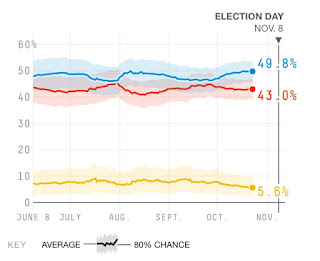Are you one of the millions of Americans who
don't like Trump, but feel obligated to vote for him to stop Hillary? I
completely understand and sympathize with this point of view, even if I don't currently share it.
But
let me present to you some facts to consider before you sully your hands only to wash them clean on November 9th.
Hillary
Clinton has led Donald Trump in the average of polls throughout the 2016
campaign. The best Trump has been able to do is pull close to a tie, which he
did at the end of July and again in late September. Clinton Clinton
In other words, Clinton is almost certain to win whether you vote for Trump or not.
In other words, Clinton is almost certain to win whether you vote for Trump or not.
Also, keep in mind the "tipping point" theory of swing states - that since states tend to move together with the polls, only the state that provides the winning 270th electoral vote really matters. In other words, if Texas turns blue on election night, that would be great for Clinton but it probably means that she already has Ohio, Florida, etc. in the bag and is winning in a landslide (fascinating concept - I highly recommend the article at the link). The chart to the left shows how likely each state is to be the tipping point state in this election based on recent polling. Most states have less than a 1% chance of being the tipping point, including yours (statistically speaking). ;)
If you do not live in one of the plausible tipping point states, your vote is highly unlikely to affect the outcome of the race.
If you do not live in one of the plausible tipping point states, your vote is highly unlikely to affect the outcome of the race.
Free Advice
My
take -- if the polls still look like this on Election Day, or if the race
between Clinton
Recently
I've been thinking about the "free-market case" against Donald Trump. No, I don't
think Trump is necessarily bad for free markets (though some of his trade talk
is troubling). Rather, what I'm referring to is the law of supply and demand
that you may or may not have learned about in Economics 101. It applies in
politics too. Here it is in a nutshell: if we, the voters, "demand" a
certain type of politician by casting our votes for them, the supply of such politicians will increase.
Voting
for Trump may save us from four years of Hillary, but it won't save us from
four years of Trump if he wins. And if Trump loses by only a point or so, he may run again
in 2020! Oh, the horror! Even if he doesn't, another populist demagogue may
sense an opportunity and come out of the woodwork. (Not to mention that if it is close, Trump may make good on his "rigged" talk and incite some kind of uprising - I hope this is a wildly improbable scenario but it's hard to say for sure the way Trump talks.)
That's
why I'm hoping that if Trump loses, he is defeated roundly and convincingly,
leaving no door ajar, no breathing room, no hope for anyone of his ilk to rise
again.
Instead,
if you vote for someone ethical and decent who shares your views, perhaps you'll encourage such people to throw their hat in the ring and next
election we'll have a better selection.
This
logic also applies to third-party candidates and to Clinton herself. If you
don't like Clinton
There
are many reasons to vote or not to vote for a particular candidate, and supply
and demand is not the supreme law of voting ethics. But it is one more factor
for you to consider as you cast your ballot in just over two weeks.


No comments:
Post a Comment